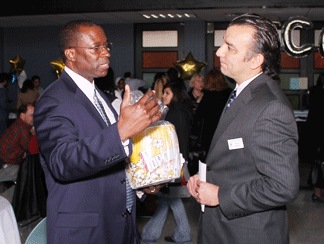Students might view college as the avenue to help them reach their dreams. For some, like TR student Jessica Garcia, the money is the motive.
“If I want to take the girls to McDonalds for a treat, I don’t want to be thinking we have to share a 10-piece chicken nugget between the three of us,” she said.
After the downturn in the economy, many companies downsized, leaving millions of Americans jobless and unemployment rates skyrocketing. For many students now in college, whether to chase the dream or the dollar is not even up for debate — job security is the only option.
Recently divorced and now a single mother of two, Garcia has become the sole income for her daughters. She has always loved fashion, and going to Paris is one of her dreams.
“I would love to travel and be a fashion consultant. I would love to inspire people and be somebody important,” she said.
However, she doesn’t see fashion as a feasible career for her. Supporting her girls is key, and the sour economy influenced her to pursue a degree in health information technology because of its stability.
“I’m not trying to get rich, but I want to have security for my girls,” she said.
“I’ve been downsized and let go because of cut costs at different companies that I’ve worked at over the years, and it’s a hard situation,” she said. “Everything I do has to reflect on getting food on the table and paying my rent.”
While TR freshman Quillan Ezue-Deen doesn’t yet have a family to support, he’s got money on his mind. He’s a physical therapy major, but rehabilitating others isn’t necessarily his dream.
“I don’t actually want to be a physical therapist,” he said. “I’m just trying to make money. My real dream is to be among celebrities and live a lavish life.”
TR financial aid director Bill McMullen said he sees returning students, many of whom already have a bachelor’s degree, back in school to change career fields because the lagging economy forced them.
“A lot of students are coming in to see me because they want to get into nursing,” he said. “In my position, I’m more looking at the financial aid aspect of it. But in my mind, I’m thinking, ‘Do you understand what the GPA cutoff is?’”
McMullen urged students to do research and dig deep to find a career they’re passionate about instead of choosing a field because it promises big bucks.
“You’re setting yourself up to use your own personal resources, your own energy, your own time and then you’re possibly borrowing money in hopes that you’re going to make the GPA cutoff, be accepted into the nursing program and enjoy that career field,” he said. “I would never dash anybody’s hopes if that’s what you really want to do. You, as an individual, need to do some internal soul-searching to find out is that what you really want to do.”
The national unemployment rate decreased from 9 percent in September to its current 8.2 percent. However, Federal Reserve Chairman Ben Bernanke said it could take “a few more years” for U.S. unemployment to decline to a normal rate, which is roughly between 5 and 6 percent.
But, TR career and employment services coordinator Kristin Vinson Wright said she still encourages students to pursue their passion.
“If you’re in a job that you’re not passionate about, I believe you’re not going to do well,” she said. “It just becomes a 9 to 5.”
While the economy has, in fact, affected some students’ career aspirations, and many visit her office to learn how to update their skills, Wright said she has more students wanting to pursue their dreams visit her office than those just seeking stable careers.
“They are trying to find out and research ‘what am I good at and is there an industry where I will be successful in this world,’” she said.
Career and employment services offers career assessment tests to help students find career fields they will enjoy. MyPlan, one such test available for students, provides information about educational requirements, salaries and job prognosis for several industries.
“Students come in and are searching, really trying to understand if there is a career that is associated with their passion,” she said.
TR freshman Nadyah Diaby wants to be of service to humanity, so she is majoring in international affairs and dreaming of becoming a diplomat. When choosing a career, she said people should follow their hearts so they don’t end up stuck in a job.
“Sometimes, people take the safe side and say, ‘I just want to be financially secure,’ and find themselves being unhappy,” she said.
Although she is following her dream, she still wants to be wealthy but also serve a greater purpose.
“Everything is based on capital, and, without capital, it’s hard to survive,” she said. “I believe in philanthropy. I believe in giving back. Money is a good factor. It’s not everything, but it makes people’s lives easier.”
About 25,000 positions were eliminated in school districts across Texas after state budget cuts took effect last summer, according to the Texas Education Agency.
While this daunting statistic lingers, TR student Elaine Weaver isn’t turning her back on her aspirations to become a teacher.
“I’m following the dream,” she said. “I’m going to school for art education. And I have thought about the economy and I know teaching positions are hard to find, but I know people in Fort Worth Independent School District.”
Weaver said she’s been expanding her experience with art and might turn it into a business, but she doesn’t plan on moving from her passion to teach.
“They’re not as broke as you think. Starting salary for a teacher is around $50,000,” she said.
“I don’t have kids, and I’m not married, so as long as I can be comfortable, I don’t really care. It’s not about the money. It’s about doing what I love.”

























